
Journal Menu
► ▼ Journal Menu-
- Forests Home
- Aims & Scope
- Editorial Board
- Reviewer Board
- Topical Advisory Panel
- Instructions for Authors
- Special Issues
- Topics
- Sections & Collections
- Article Processing Charge
- Indexing & Archiving
- Editor’s Choice Articles
- Most Cited & Viewed
- Journal Statistics
- Journal History
- Journal Awards
- Conferences
- Editorial Office
Journal Browser
► ▼ Journal BrowserNeed Help?
Announcements
23 August 2023
Meet Us at the 2023 Annual Meeting of the Geographical Society of China—Commission on Urban Geography, 15–18 September 2023, Wuhan, China
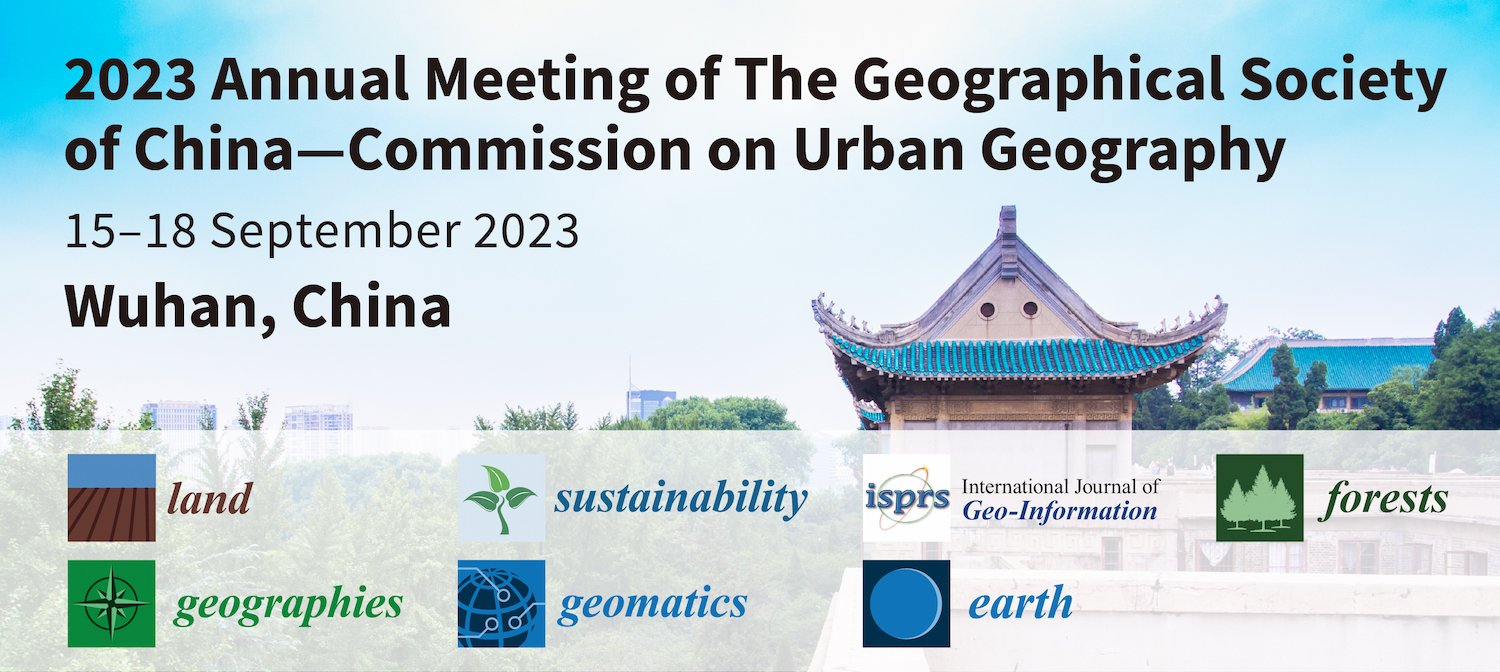
MDPI is attending the 2023 Annual Meeting of the Geographical Society of China—Commission on Urban Geography. The event will be held at Wuhan University, China, from 15 to 18 September 2023, and it is organized by the Geographical Society of China. This conference will focus on the theme "Innovative Development of Urban Geography for Chinese Modernization"; it will exchange new ideas, new trends, new methods and new practices of urban geography, explore new opportunities, new positioning and new paradigms for the development of urban geography in the context of disciplinary integration, and jointly promote the prosperity and development of urban geography in China.
Representatives of the following MDPI journals will be attending:
- Land (leading journal);
- Sustainability;
- IJGI;
- Forests;
- Geomatics;
- Geographies;
- Earth.
If you are also attending this conference, please feel free to stop by our booth. Our delegates look forward to meeting you in person to answer any questions you may have. For more information about the conference, please visit: http://www.gsc.org.cn/web/#/meeting/2fea355b-6e53-412e-8119-797535909665.
23 August 2023
Forests | Invitation to Read Editor’s Choice Articles Selected from Volume 14, Issues 4–6
We are pleased to share the following ten Editor's Choice Articles published in Forests (ISSN: 1999-4907). These papers were selected by our Editors-in-Chief from the most notable papers published in Volume 14, Issues 4‒6. All these papers are of particular interest or importance to readers and are all well received by researchers.
1. “An Overview of Oak Species in Pakistan: Past, Present, and Future Research Perspectives”
by Noor Muhammad, María Ángeles Castillejo, Maria-Dolores Rey and Jesús V. Jorrín-Novo
Forests 2023, 14(4), 777; https://doi.org/10.3390/f14040777
Available online: https://www.mdpi.com/1999-4907/14/4/777
2. “A Multi-Country Study Assessing the Mechanisms of Natural Elements and Sociodemographics behind the Impact of Forest Bathing on Well-Being”
by Montse Subirana-Malaret, Alexandre Miró, Aracely Camacho, Alex Gesse and Kirsten McEwan
Forests 2023, 14(4), 904; https://doi.org/10.3390/f14050904
Available online: https://www.mdpi.com/1999-4907/14/5/904
3. “Tree Species Classification in a Complex Brazilian Tropical Forest Using Hyperspectral and LiDAR Data”
by Rorai Pereira Martins-Neto, Antonio Maria Garcia Tommaselli, Nilton Nobuhiro Imai, Eija Honkavaara, Milto Miltiadou, Erika Akemi Saito Moriya and Hassan Camil David
Forests 2023, 14(5), 157; https://doi.org/10.3390/f14050945
Available online: https://www.mdpi.com/1999-4907/14/5/945
4. “Defective or Just Different? Observed Storm Failure in Four Urban Tree Growth Patterns”
by Andrew K. Koeser, Ryan W. Klein, Richard J. Hauer, Jason W. Miesbauer, Zachary Freeman, Christopher Harchick and Brian Kane
Forests 2023, 14(5), 311; https://doi.org/10.3390/f14050988
Available online: https://www.mdpi.com/1999-4907/14/5/988
5. “Microevolutionary Processes in a Foundation Tree Inform Macrosystem Patterns of Community Biodiversity and Structure”
by Helen M. Bothwell, Arthur R. Keith, Hillary F. Cooper, Julia B. Hull, Lela V. Andrews, Christian Wehenkel, Kevin R. Hultine, Catherine A. Gehring, Samuel A. Cushman, Thomas G. Whitham et al.
Forests 2023, 14(5), 248; https://doi.org/10.3390/f14050943
Available online: https://www.mdpi.com/1999-4907/14/5/943
6. “Exploring the Potential of Portable Spectroscopic Techniques for the Biochemical Characterization of Roots in Shallow Landslides”
by Lorenzo Marzini, Daniele Ciofini, Juri Agresti, Leonardo Ciaccheri, Enrico D’Addario, Leonardo Disperati, Salvatore Siano and Iacopo Osticioli
Forests 2023, 14(4), 385; https://doi.org/10.3390/f14040825
Available online: https://www.mdpi.com/1999-4907/14/4/825
7. “Temperature and Tree Size Explain the Mean Time to Fall of Dead Standing Trees across Large Scales”
by Antje Gärtner, Anna Maria Jönsson, Daniel B. Metcalfe, Thomas A. M. Pugh, Torbern Tagesson and Anders Ahlström
Forests 2023, 14(5), 469; https://doi.org/10.3390/f14051017
Available online: https://www.mdpi.com/1999-4907/14/5/1017
8. “Suitability of a Historical, Novel, and Occasional Host for Mountain Pine Beetle (Coleoptera: Curculionidae)”
by Katherine P. Bleiker, Claire A. Ethier and Brian H. Van Hezewijk
Forests 2023, 14(5), 559; https://doi.org/10.3390/f14050989
Available online: https://www.mdpi.com/1999-4907/14/5/989
9. “Long-Term Simulated Nitrogen Deposition Has Moderate Impacts on Soil Microbial Communities across Three Bioclimatic Domains of the Eastern Canadian Forest”
by Marie Renaudin, Rim Khlifa, Simon Legault, Steven W. Kembel, Daniel Kneeshaw, Jean-David Moore and Daniel Houle
Forests 2023, 14(5), 479; https://doi.org/10.3390/f14061124
Available online: https://www.mdpi.com/1999-4907/14/6/1124
10. “Alignment of National Forest Policy Frameworks with the EU Timber Regulation Requirements: Insights from Montenegro and the Republic of Srpska (Bosnia and Herzegovina)”
by Maja Radosavljevic, Mauro Masiero, Todora Rogelja and Dragan Comic
Forests 2023, 14(6), 210; https://doi.org/10.3390/f14061157
Available online: https://www.mdpi.com/1999-4907/14/6/1157
We would like to thank all the research groups behind these exceptional papers for their contributions to Forests. We would greatly appreciate it if you could circulate this document among your colleagues or through your network.
If you want to learn more about the contributions published in Editor’s Choice Articles, please click here.
15 August 2023
Meet Us at the 14th National Conference on Biodiversity—1st International Conference on Mediterranean Biodiversity, 13–15 September 2023, Lecce, Italy
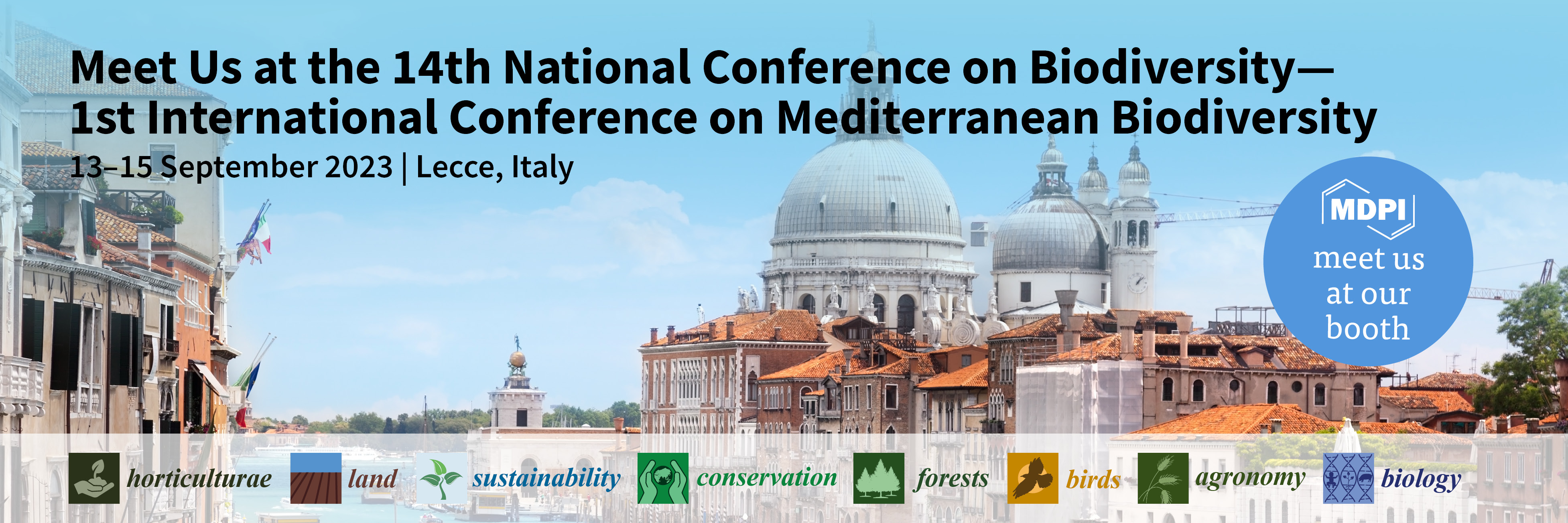
MDPI journals will be attending the 14th National Conference on Biodiversity 1st International Conference on Mediterranean Biodiversity as an exhibitor. This meeting will be held in Lecce, Italy from 13 to 15 September 2023.
The 14th National Conference on Biodiversity will be organized by the Department of Biological and Environmental Sciences and Technologies (DiSTeBA) of the University of Salento in collaboration with the Academy of Mediterranean Biodiversity Sciences (ASBM) in order to continue the discussion and dialogue initiated more than 25 years ago, among scientists, institutional and policymakers, on issues related to the mutually complementary domains of the biodiversity: biodiversity at the intraspecific level, at the interspecific level, and at the entire ecosystem level. The aim is to help promote the advancement of knowledge based on the rigor of the scientific method. In particular, the 14th National Biodiversity Conference will be a showcase for studies and research focusing on “Biodiversity, Resilience and Climate Change”.
The following MDPI journals will be represented:
If you are attending this conference, please feel free to start a conversation with us. Our delegates look forward to meeting you in person and answering any questions you may have. For more information about the conference and our booth, please visit https://leccebiodiversity2023.com/.
31 July 2023
MDPI’s 2022 Best PhD Thesis Awards in Environmental and Earth Sciences—Winners Announced
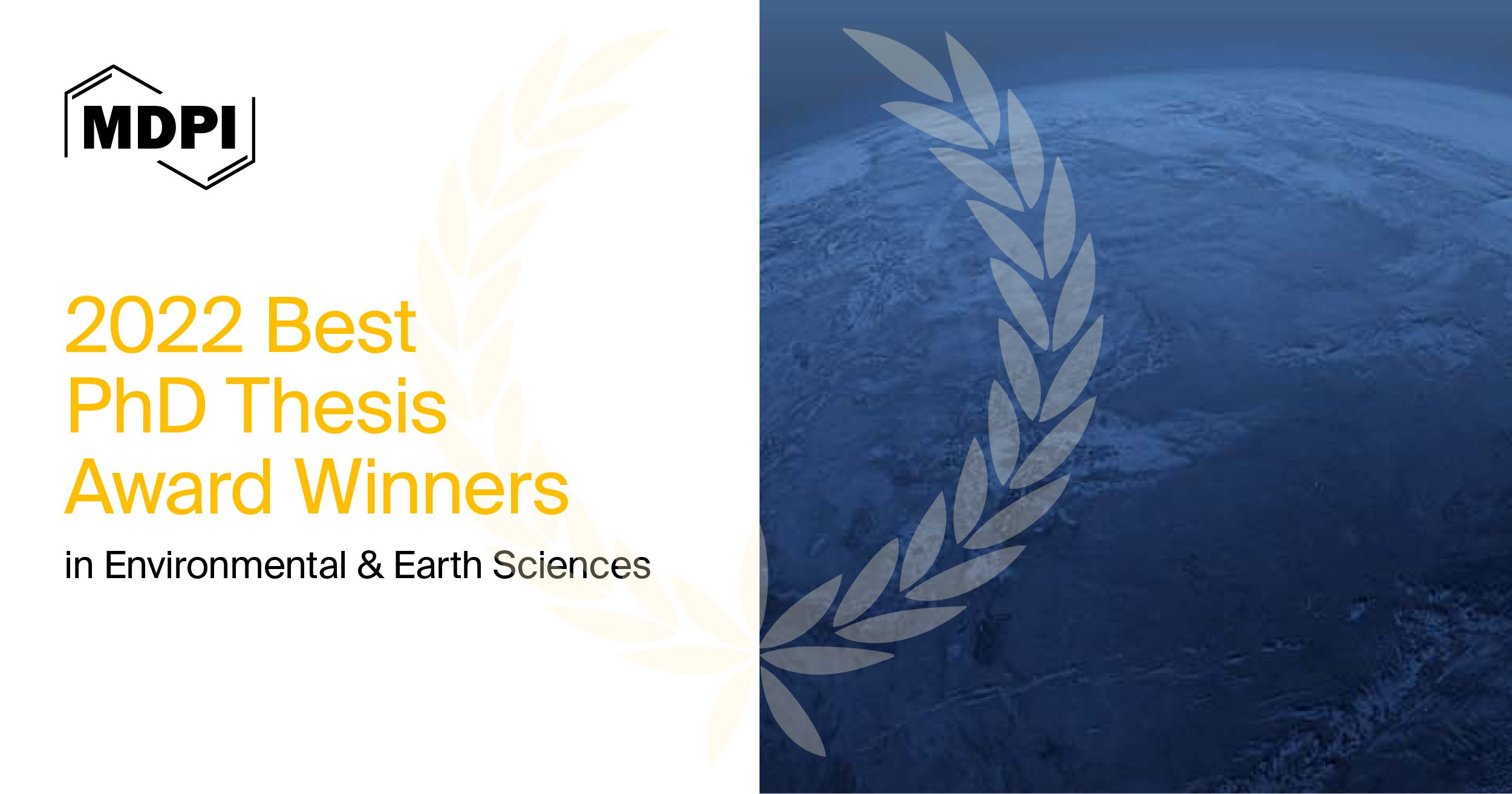
MDPI’s Best PhD Thesis Awards are presented to recognize the young scholars who are deemed to have completed the most outstanding PhD thesis in their field of research and to encourage them to continue their outstanding work and make further contributions to their field.
We would like to warmly congratulate the winners of the 2022 Best PhD Thesis Awards and wish them success with their future research endeavors.
- “Variability of Ocean Dynamics and Associated Mechanisms Over the Tropical Indian Ocean”
by Sartaj Khan, Harbin Engineering University, China
- “Nanofluid Impingement Jet Heat Transfer”
by Javad Mohammadpour, Macquarie University, Australia
- “Abiotic Sedimentary Dolomite Formation: from Nano- to Macro-Scale”
by Yihang Fang, Washington University, USA
- “Effects of Rare Earth Elements on Aquatic Organisms under a Changing Environment”
by Catia Figueiredo, CIIMAR—Interdisciplinary Centre of Marine and Environmental Research, Portugal
- “Green-Gray Coupled Runoff Control Infrastructure Adaptive Multi-Objective Optimization Method”
by Zijing Liu, Tsinghua University, China
About MDPI Awards:
In order to reward the academic community, especially young researchers and enhance communication among scientists, MDPI journals regularly offer various awards to researchers in specific fields. These awards, serving as a source of inspiration and recognition, help raise the influence of talented individuals who have been credited with outstanding achievements and are making a significant contribution to the advancement of their fields.
To explore more MDPI awards, please click here.
31 July 2023
MDPI’s 2022 Best Paper Awards in Environmental and Earth Sciences—Winners Announced
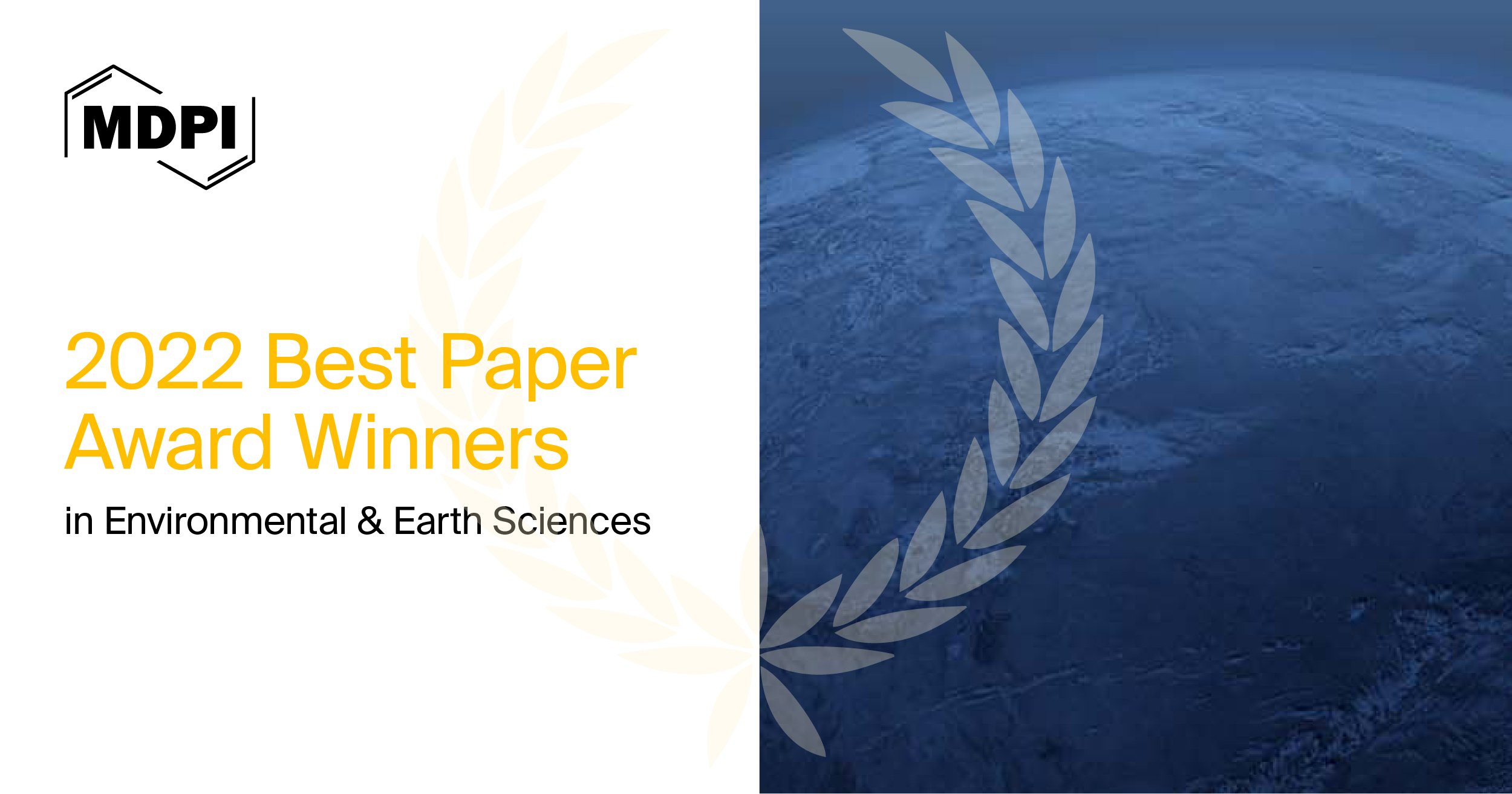
The purpose of our Best Paper Awards is to promote and recognize the most impactful contributions published within MDPI journals.
The editors of each journal carefully selected reviews and research papers through a rigorous judging process based on criteria such as the scientific merit, overall impact, and the quality of presentation of the papers published in the journal.
We are honored to present the winners for the year 2022 in environmental and earth sciences, who were selected amongst the extensive competition, and congratulate the authors for their outstanding scientific publications.
- “Covid-19 Airborne Transmission and Its Prevention: Waiting for Evidence or Applying the Precautionary Principle?”
by Annalaura Carducci, Ileana Federigi and Marco Verani
Atmosphere 2020, 11(7), 710; https://doi.org/10.3390/atmos11070710
- “The Heat Health Warning System in Germany—Application and Warnings for 2005 to 2019”
by Andreas Matzarakis, Gudrun Laschewski and Stefan Muthers
Atmosphere 2020, 11(2), 170; https://doi.org/10.3390/atmos11020170
- “Temporal Hydrological Drought Index Forecasting for New South Wales, Australia Using Machine Learning Approaches”
by Abhirup Dikshit, Biswajeet Pradhan and Abdullah M. Alamri
Atmosphere 2020, 11(6), 585; https://doi.org/10.3390/atmos11060585
- “Lignocellulosic Biomass Mild Alkaline Fractionation and Resulting Extract Purification Processes: Conditions, Yields, and Purities”
by Vincent Oriez, Jérôme Peydecastaing and Pierre-Yves Pontalier
Clean Technol. 2020, 2(1), 91-115; https://doi.org/10.3390/cleantechnol2010007
- “Environmental and Economic Evaluation of Fuel Choices for Short Sea Shipping”
by Kirsi Spoof-Tuomi and Seppo Niemi
Clean Technol. 2020, 2(1), 34-52; https://doi.org/10.3390/cleantechnol2010004
- “Analyzing Similarities between the European Union Countries in Terms of the Structure and Volume of Energy Production from Renewable Energy Sources”
by Jarosław Brodny and Magdalena Tutak
Energies 2020, 13(4), 913; https://doi.org/10.3390/en13040913
- “High Reynold’s Number Turbulent Model for Micro-Channel Cold Plate Using Reverse Engineering Approach for Water-Cooled Battery in Electric Vehicles”
by Satyam Panchal, Krishna Gudlanarva, Manh-Kien Tran, Roydon Fraser and Michael Fowler
Energies 2020, 13(7), 1638; https://doi.org/10.3390/en13071638 - “Investigation of Inorganic Phase Change Material for a Semi-Transparent Photovoltaic (STPV) Module”
by Alagar Karthick, Muthu Manokar Athikesavan, Manoj Kumar Pasupathi, Nallapaneni Manoj Kumar, Shauhrat S. Chopra and Aritra Ghosh
Energies 2020, 13(14), 3582; https://doi.org/10.3390/en13143582
- “Considerations on Potentials, Greenhouse Gas, and Energy Performance of Biofuels Based on Forest Residues for Heavy-Duty Road Transport in Sweden”
by Shveta Soam and Pål Börjesson
Energies 2020, 13(24), 6701; https://doi.org/10.3390/en13246701
- “Characterization of Hybrid-nano/Paraffin Organic Phase Change Material for Thermal Energy Storage Applications in Solar Thermal Systems”
by Manoj Kumar Pasupathi, Karthick Alagar, Michael Joseph Stalin P, Matheswaran M. M and Ghosh Aritra
Energies 2020, 13(19), 5079; https://doi.org/10.3390/en13195079
- “Snapshot of Photovoltaics—February 2020”
by Arnulf Jäger-Waldau
Energies 2020, 13(4), 930; https://doi.org/10.3390/en13040930
- “The Importance of Renewable Energy Sources in Poland’s Energy Mix”
by Renata Marks-Bielska, Stanisław Bielski, Katarzyna Pik and Krystyna Kurowska
Energies 2020, 13(18), 4624; https://doi.org/10.3390/en13184624
- “Infectious Diseases, Market Uncertainty and Oil Market Volatility”
by Elie Bouri, Riza Demirer, Rangan Gupta and Christian Pierdzioch
Energies 2020, 13(16), 4090; https://doi.org/10.3390/en13164090
- “Cost of Equity of Coal-Fired Power Generation Projects in Poland: Its Importance for the Management of Decision-Making Process”
by Piotr W. Saługa, Katarzyna Szczepańska-Woszczyna, Radosław Miśkiewicz and Mateusz Chłąd
Energies 2020, 13(18), 4833; https://doi.org/10.3390/en13184833
- “Internet of Things (IoT) and the Energy Sector”
by Naser Hossein Motlagh, Mahsa Mohammadrezaei, Julian Hunt and Behnam Zakeri
Energies 2020, 13(2), 494; https://doi.org/10.3390/en13020494
- “A Review on Thermoelectric Generators: Progress and Applications”
by Mohamed Amine Zoui, Saïd Bentouba, John G. Stocholm and Mahmoud Bourouis
Energies 2020, 13(14), 3606; https://doi.org/10.3390/en13143606
- “Contributions and Risks of Artificial Intelligence (AI) in Building Smarter Cities: Insights from a Systematic Review of the Literature”
by Tan Yigitcanlar, Kevin C. Desouza, Luke Butler and Farnoosh Roozkhosh
Energies 2020, 13(6), 1473; https://doi.org/10.3390/en13061473
- “Possibilities and Challenges for the Inclusion of the Electric Vehicle (EV) to Reduce the Carbon Footprint in the Transport Sector: A Review”
by Aritra Ghosh
Energies 2020, 13(10), 2602; https://doi.org/10.3390/en13102602
- “Energy and Climate Policy—An Evaluation of Global Climate Change Expenditure 2011–2018”
by Coilín ÓhAiseadha, Gerré Quinn, Ronan Connolly, Michael Connolly and Willie Soon
Energies 2020, 13(18), 4839; https://doi.org/10.3390/en13184839 - “A Review of The Methanol Economy: The Fuel Cell Route”
by Samuel Simon Araya, Vincenzo Liso, Xiaoti Cui, Na Li, Jimin Zhu, Simon Lennart Sahlin, Søren Højgaard Jensen, Mads Pagh Nielsen and Søren Knudsen Kær
Energies 2020, 13(3), 596; https://doi.org/10.3390/en13030596
- “Microplastic Contamination in Freshwater Environments: A Review, Focusing on Interactions with Sediments and Benthic Organisms”
by Arianna Bellasi, Gilberto Binda, Andrea Pozzi, Silvia Galafassi, Pietro Volta and Roberta Bettinetti
Environments 2020, 7(4), 30; https://doi.org/10.3390/environments7040030
- “Biogas Production from Food Residues—The Role of Trace Metals and Co-Digestion with Primary Sludge”
by Moshe Habagil, Alexander Keucken and Ilona Sárvári Horváth
Environments 2020, 7(6), 42; https://doi.org/10.3390/environments7060042
- “Coastal Pine-Oak Glacial Refugia in the Mediterranean Basin: A Biogeographic Approach Based on Charcoal Analysis and Spatial Modelling”
by Gaetano Di Pasquale, Antonio Saracino, Luciano Bosso, Danilo Russo, Adriana Moroni, Giuliano Bonanomi and Emilia Allevato
Forests 2020, 11(6), 673; https://doi.org/10.3390/f11060673
- “A Survey in Natural Forest Ecosystems of Vietnam Reveals High Diversity of both New and Described Phytophthora Taxa including ramorum”
by Thomas Jung, Bruno Scanu, Clive M. Brasier, Joan Webber, Ivan Milenković, Tamara Corcobado, Michal Tomšovský, Matěj Pánek, József Bakonyi, Cristiana Maia et al.
Forests 2020, 11(1), 93; https://doi.org/10.3390/f11010093
- “Living in Drylands: Functional Adaptations of Trees and Shrubs to Cope with High Temperatures and Water Scarcity”
by José Javier Peguero-Pina, Alberto Vilagrosa, David Alonso-Forn, Juan Pedro Ferrio, Domingo Sancho-Knapik and Eustaquio Gil-Pelegrín
Forests 2020, 11(10), 1028; https://doi.org/10.3390/f11101028
- “Advances and Promises of Epigenetics for Forest Trees”
by Joana Amaral, Zoé Ribeyre, Julien Vigneaud, Mamadou Dia Sow, Régis Fichot, Christian Messier, Gloria Pinto, Philippe Nolet and Stéphane Maury
Forests 2020, 11(9), 976; https://doi.org/10.3390/f11090976
- “Cartographic Vandalism in the Era of Location-Based Games—The Case of OpenStreetMap and Pokémon GO”
by Levente Juhász, Tessio Novack, Hartwig H. Hochmair and Sen Qiao
ISPRS Int. J. Geo-Inf. 2020, 9(4), 197; https://doi.org/10.3390/ijgi9040197
- “A Comprehensive Review of Rare Earth Elements Recovery from Coal-Related Materials”
by Wencai Zhang, Aaron Noble, Xinbo Yang and Rick Honaker
Minerals 2020, 10(5), 451; https://doi.org/10.3390/min10050451 - “SEM-Based Automated Mineralogy and Its Application in Geo- and Material Sciences”
by Bernhard Schulz, Dirk Sandmann and Sabine Gilbricht
Minerals 2020, 10(11), 1004; https://doi.org/10.3390/min10111004
- “Characteristics of Precipitation of Rare Earth Elements with Various Precipitants”
by Kenneth N. Han
Minerals 2020, 10(2), 178; https://doi.org/10.3390/min10020178
- “Lithium-Rich Claystone in the McDermitt Caldera, Nevada, USA: Geologic, Mineralogical, and Geochemical Characteristics and Possible Origin”
by Stephen B. Castor and Christopher D. Henry
Minerals 2020, 10(1), 68; https://doi.org/10.3390/min10010068
- “Using Complementary Methods of Synchrotron Radiation Powder Diffraction and Pair Distribution Function to Refine Crystal Structures with High Quality Parameters—A Review”
by Seungyeol Lee and Huifang Xu
Minerals 2020, 10(2), 124; https://doi.org/10.3390/min10020124
- “Erosive Response of Non-Glaciated Pyrenean Headwater Catchments to the Last Major Climate Transition and Establishing Interglacial Conditions”
by Kurt Martin Stange, Ivar Midtkandal, Johan Petter Nystuen, Andrew Murray, Reza Sohbati, Warren Thompson, Cornelia Spiegel and Hans-Joachim Kuss
Quaternary 2019, 2(2), 17; https://doi.org/10.3390/quat2020017
- “Last Interglacial Climate in Northern Sweden—Insights from a Speleothem Record”
by Martin Finné, Sakari Salonen, Norbert Frank, Karin F. Helmens, Andrea Schröder-Ritzrau, Michael Deininger and Steffen Holzkämper
Quaternary 2019, 2(3), 29; https://doi.org/10.3390/quat2030029
- “Climatically Controlled River Terraces in Eastern Australia”
by James S. Daley and Tim J. Cohen
Quaternary 2018, 1(3), 23; https://doi.org/10.3390/quat1030023
- “Dropstones in Lacustrine Sediments as a Record of Snow Avalanches—A Validation of the Proxy by Combining Satellite Imagery and Varve Chronology at Kenai Lake (South-Central Alaska)”
by Sien Thys, Maarten Van Daele, Nore Praet, Britta J. L. Jensen, Thomas Van Dyck, Peter J. Haeussler, Elke Vandekerkhove, Veerle Cnudde and Marc De Batist
Quaternary 2019, 2(1), 11; https://doi.org/10.3390/quat2010011
- “From Climatic to Anthropogenic Drivers: A Multi-Proxy Reconstruction of Vegetation and Peatland Development in the French Jura Mountains”
by Emilie Gauthier, Vincent E. J. Jassey, Edward A. D. Mitchell, Mariusz Lamentowicz, Richard Payne, Frédéric Delarue, Fatima Laggoun-Defarge, Daniel Gilbert and Hervé Richard
Quaternary 2019, 2(4), 38; https://doi.org/10.3390/quat2040038
- “Current Practices in UAS-based Environmental Monitoring”
by Goran Tmušić, Salvatore Manfreda, Helge Aasen, Mike R. James, Gil Gonçalves, Eyal Ben-Dor, Anna Brook, Maria Polinova, Jose Juan Arranz, János Mészáros et al.
Remote Sens. 2020, 12(6), 1001; https://doi.org/10.3390/rs12061001
- “Change Detection Based on Artificial Intelligence: State-of-the-Art and Challenges”
by Wenzhong Shi, Min Zhang, Rui Zhang, Shanxiong Chen and Zhao Zhan
Remote Sens. 2020, 12(10), 1688; https://doi.org/10.3390/rs12101688 - “A Spatial-Temporal Attention-Based Method and a New Dataset for Remote Sensing Image Change Detection”
by Hao Chen and Zhenwei Shi
Remote Sens. 2020, 12(10), 1662; https://doi.org/10.3390/rs12101662
- “Mapping Landslides on EO Data: Performance of Deep Learning Models vs. Traditional Machine Learning Models”
by Nikhil Prakash, Andrea Manconi and Simon Loew
Remote Sens. 2020, 12(3), 346; https://doi.org/10.3390/rs12030346
- “LiCSBAS: An Open-Source InSAR Time Series Analysis Package Integrated with the LiCSAR Automated Sentinel-1 InSAR Processor”
by Yu Morishita, Milan Lazecky, Tim J. Wright, Jonathan R. Weiss, John R. Elliott and Andy Hooper
Remote Sens. 2020, 12(3), 424; https://doi.org/10.3390/rs12030424
- “A Novel Method for Safety Analysis of Cyber-Physical Systems—Application to a Ship Exhaust Gas Scrubber System”
by Victor Bolbot, Gerasimos Theotokatos, Evangelos Boulougouris, George Psarros and Rainer Hamann
Safety 2020, 6(2), 26; https://doi.org/10.3390/safety6020026
- “Characteristics of Commuters’ Single-Bicycle Crashes in Insurance Data”
by Roni Utriainen
Safety 2020, 6(1), 13; https://doi.org/10.3390/safety6010013
- “Effect of Road Markings and Traffic Signs Presence on Young Driver Stress Level, Eye Movement and Behaviour in Night-Time Conditions: A Driving Simulator Study”
by Darko Babić, Dario Babić, Hrvoje Cajner, Ana Sruk and Mario Fiolić
Safety 2020, 6(2), 24; https://doi.org/10.3390/safety6020024
- “COVID-19 Could Leverage a Sustainable Built Environment”
by Manuel Duarte Pinheiro and Nuno Cardoso Luís
Sustainability 2020, 12(14), 5863; https://doi.org/10.3390/su12145863
- “Mapping the Sustainable Development Goals Relationships”
by Luis Miguel Fonseca, José Pedro Domingues and Alina Mihaela Dima
Sustainability 2020, 12(8), 3359; https://doi.org/10.3390/su12083359
- “The Impact of COVID-19 Pandemic on the Resilience of Sustainable Mobility in Sicily”
by Tiziana Campisi, Socrates Basbas, Anastasios Skoufas, Nurten Akgün, Dario Ticali and Giovanni Tesoriere
Sustainability 2020, 12(21), 8829; https://doi.org/10.3390/su12218829
- “Artificial Intelligence in the Agri-Food System: Rethinking Sustainable Business Models in the COVID-19 Scenario”
by Assunta Di Vaio, Flavio Boccia, Loris Landriani and Rosa Palladino
Sustainability 2020, 12(12), 4851; https://doi.org/10.3390/su12124851
- “Interaction of Environmental Pollutants with Microplastics: A Critical Review of Sorption Factors, Bioaccumulation and Ecotoxicological Effects”
by Albert Menéndez-Pedriza and Joaquim Jaumot
Toxics 2020, 8(2), 40; https://doi.org/10.3390/toxics8020040
- “Analysis of Cannabinoid-Containing Fluids in Illicit Vaping Cartridges Recovered from Pulmonary Injury Patients: Identification of Vitamin E Acetate as a Major Diluent”
by Bryan Duffy, Lingyun Li, Shijun Lu, Lorie Durocher, Mark Dittmar, Emily Delaney-Baldwin, Deepika Panawennage, David LeMaster, Kristen Navarette and David Spink
Toxics 2020, 8(1), 8; https://doi.org/10.3390/toxics8010008
- “Assessing the Benefits of Forested Riparian Zones: A Qualitative Index of Riparian Integrity Is Positively Associated with Ecological Status in European Streams”
by Francis J. Burdon, Ellinor Ramberg, Jasmina Sargac, Marie Anne Eurie Forio, Nancy de Saeyer, Petra Thea Mutinova, Therese Fosholt Moe, Mihaela Oprina Pavelescu, Valentin Dinu, Constantin Cazacu et al.
Water 2020, 12(4), 1178; https://doi.org/10.3390/w12041178
- “Worldwide Regulations and Guidelines for Agricultural Water Reuse: A Critical Review”
by Farshid Shoushtarian and Masoud Negahban-Azar
Water 2020, 12(4), 971; https://doi.org/10.3390/w12040971
- “Adsorption of Methylene Blue in Water onto Activated Carbon by Surfactant Modification”
by Yu Kuang, Xiaoping Zhang and Shaoqi Zhou
Water 2020, 12(2), 587; https://doi.org/10.3390/w12020587
- “Antimicrobials and Antibiotic-Resistant Bacteria: A Risk to the Environment and to Public Health”
by Liliana Serwecińska
Water 2020, 12(12), 3313; https://doi.org/10.3390/w12123313
About MDPI Awards:
In order to reward the academic community, especially young researchers and enhance communication among scientists, MDPI journals regularly offer various awards to researchers in specific fields. These awards, serving as a source of inspiration and recognition, help raise the influence of talented individuals who have been credited with outstanding achievements and are making a significant contribution to the advancement of their fields.
To explore more MDPI awards, please click here.
31 July 2023
MDPI’s 2022 Young Investigator Awards in Environmental and Earth Sciences—Winners Announced
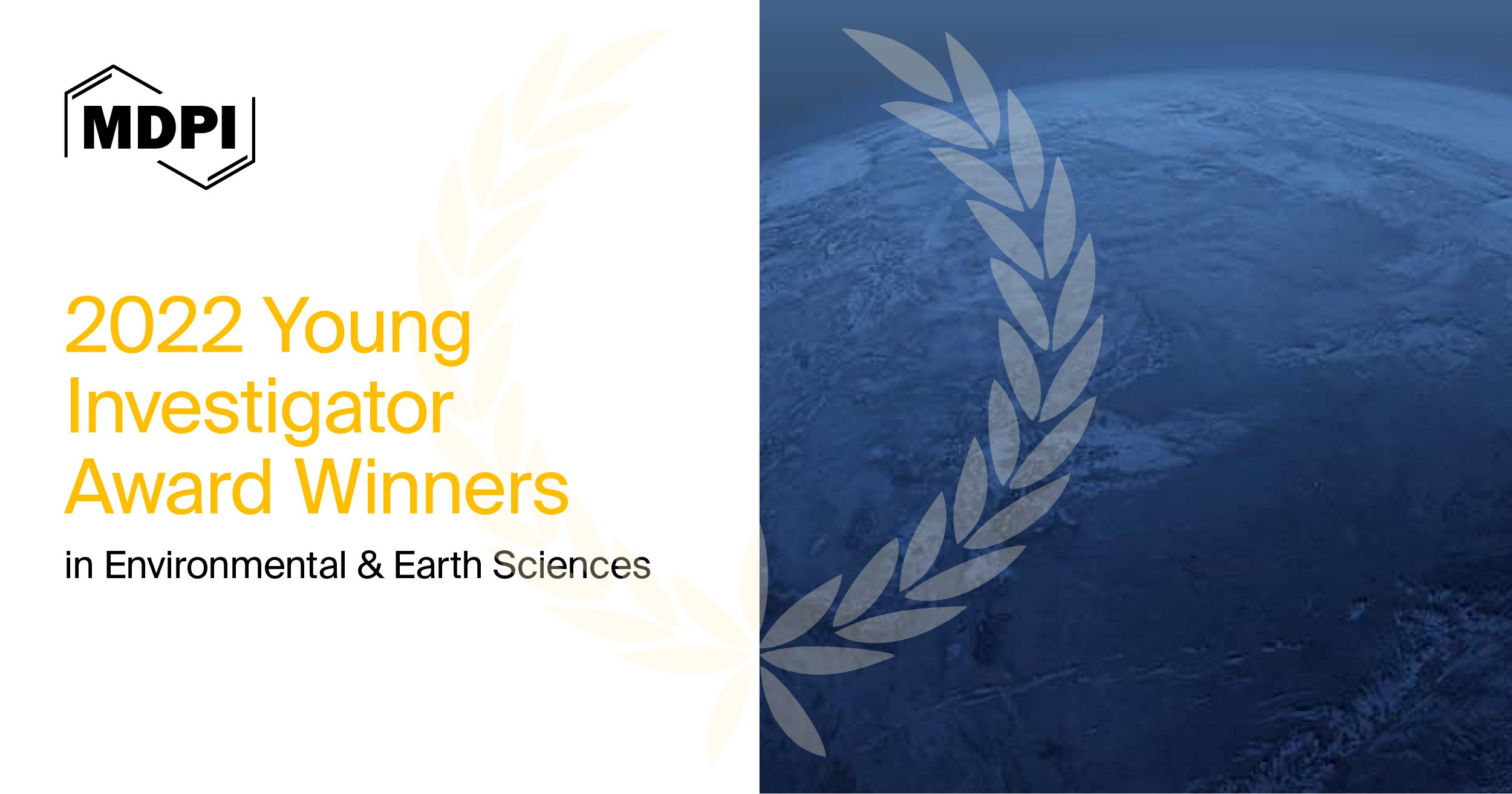
MDPI’s Young Investigator Awards recognize promising junior researchers, acknowledge their contributions, and enhance communication among scientists. We are proud to present the winners for the year 2022 in environmental and earth sciences. The winners were selected by the journals’ Award Evaluation Committee.
We warmly congratulate the awarded young investigators for their outstanding contributions. MDPI will continue to provide support and recognition to the academic community.
- Jianhuai Ye, Southern University of Science and Technology, China
- Saeed Golestan, Aalborg University (AAU), Denmark
- Michael Bertram, Swedish University of Agricultural Sciences, Sweden
- Shaunna M. Morrison, Carnegie Institution for Science, USA
- Danfeng Hong, Qingdao University, China
- Xiaolei Yuan, Aalto University, Finland
- Minjian Chen, Nanjing Medical University, China
- Sergi Garcia-Segura, Arizona State University, USA
About MDPI Awards:
In order to reward the academic community, especially young researchers and enhance communication among scientists, MDPI journals regularly offer various awards to researchers in specific fields. These awards, serving as a source of inspiration and recognition, help raise the influence of talented individuals who have been credited with outstanding achievements and are making a significant contribution to the advancement of their fields.
To explore more MDPI awards, please click here.
31 July 2023
MDPI’s 2022 Travel Awards in Environmental and Earth Sciences—Winners Announced
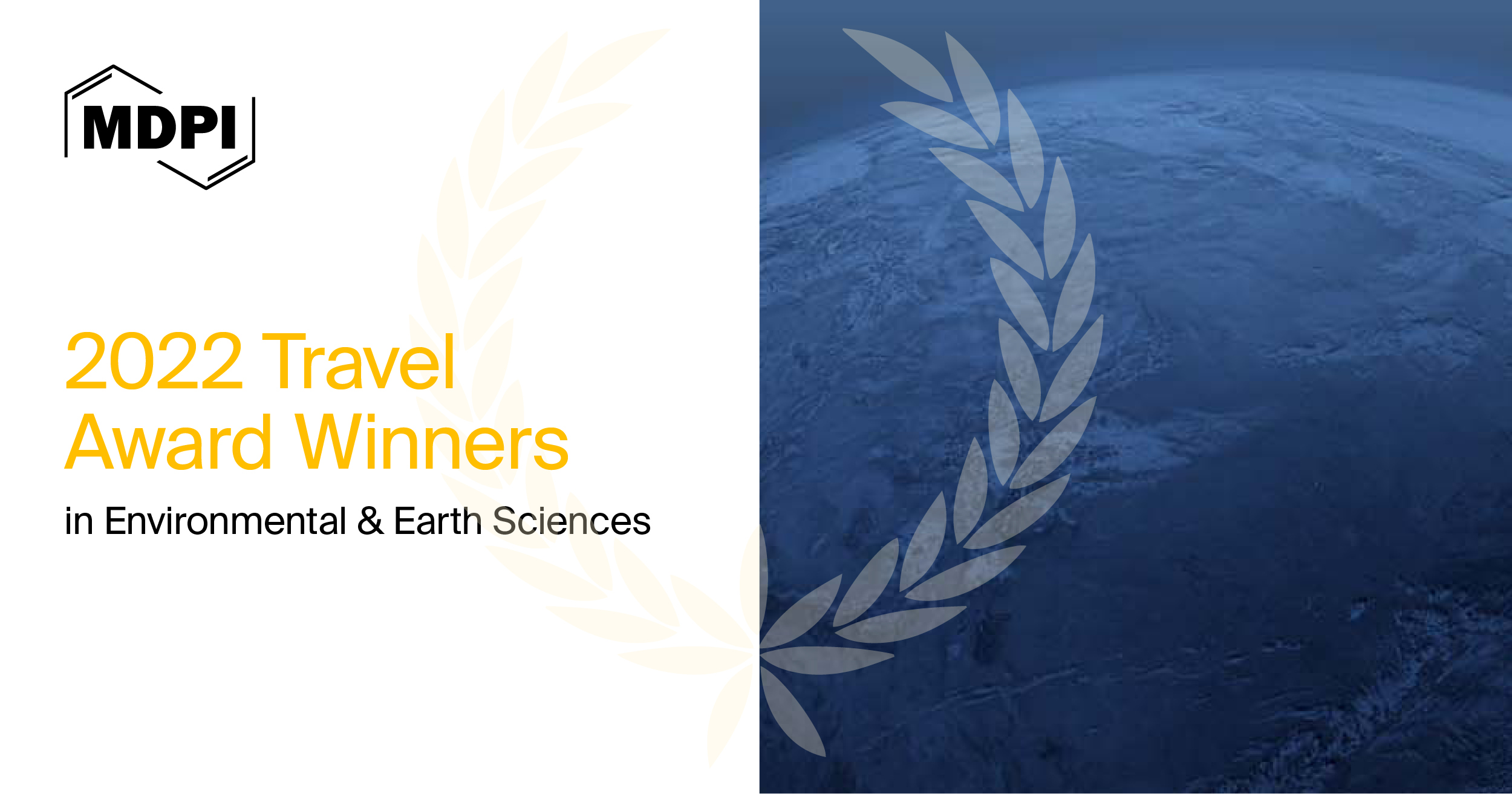
We are proud to recognize the winners of MDPI’s 2022 Travel Awards in environmental and earth sciences for their outstanding presentations and to present them with the prize.
MDPI journals regularly offer travel awards to encourage junior scientists to present their latest research at academic conferences in specific fields, which helps to increase their influence.
The winners mentioned below were carefully selected by the journal editors based on an outline of their research and the work to be presented at an academic conference.
We would like to warmly congratulate the winners of the 2022 Travel Awards and wish them the greatest success with their future research endeavors.
- Pavani Misra, Indian Institute of Technology Kanpur, India
- Runxia Cai, North Carolina State University, USA
- Lukasz Niedzwiecki, Wrocław University of Science and Technology, Poland
- Michael Eze, 1Macquarie University, Australia; 2University of Goettingen, Germany
- Murillo Vetroni Barros, Federal University of Technology—Paraná, Brazil
- Ana Novo, University of Vigo, Spain
- Eko Setio Wibowo, Kyungpook National University, Republic of Korea
- Esmaiil Mokarighahroodi, Texas A&M University, USA
- Roseane F. De Fátima Guimarães, Université de Montréal, Canada
- Phillips E. Obasohan, University of Sheffield, UK
- Katarina Baralić, University of Belgrade, Serbia
- Xianglong Xu, Monash University, Australia
- Jianwei Huang, The Chinese University of Hong Kong, China
- Sevim Sezi Karayazi, Eindhoven University of Technology, the Netherlands
- Rocky Talchabhadel, Texas A&M AgriLife Research, USA
- Leah Renwick, University of Chile, Chile
- Ana Novo, University of Vigo, Spain
- Renée Mie Fredensborg Hansen, 1Technical University of Denmark; 2Norwegian University of Science and Technology (in collaboration with The University Centre in Svalbard), Norway
- Aida Hosseinian, Oulu University, Finland
- Morteza Nazari-Heris, Pennsylvania State University, USA
- Domenico Mazzeo, University of Calabria, Italy
- Yuan Chen, The University of Sydney, Australia
- Sonia Khadija Maïté Gueroun, Tecnologia e Inovação (ARDITI), Portugal
- Konstantina Tsigkou, University of Patras, Greece
- Sabolc Pap, University of the Highlands and Islands, UK
- Xuexiu Jia, Brno University of Technology, Czech Republic
- Angelos Alamanos, Dundalk Institute of Technology, Ireland
About MDPI Awards:
In order to reward the academic community, especially young researchers and enhance communication among scientists, MDPI journals regularly offer various awards to researchers in specific fields. These awards, serving as a source of inspiration and recognition, help raise the influence of talented individuals who have been credited with outstanding achievements and are making a significant contribution to the advancement of their fields.
To explore more MDPI awards, please click here.
31 July 2023
MDPI’s 2022 Outstanding Reviewer Awards in Environmental and Earth Sciences—Winners Announced
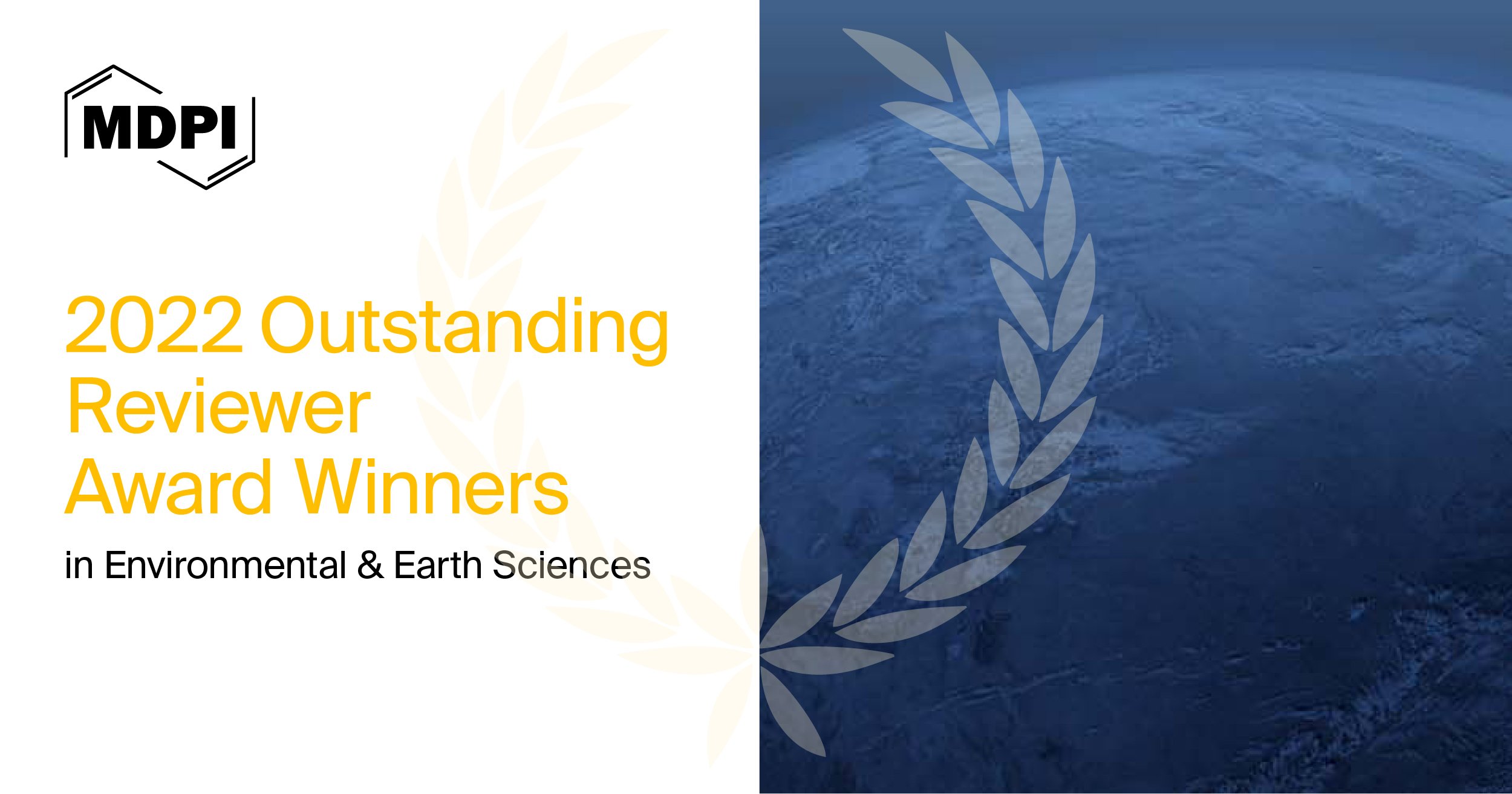
In order to acknowledge our reviewers, who so generously dedicate their time to reviewing papers and demonstrate diligence, professionalism, and timeliness when reviewing manuscripts, MDPI journals regularly offer outstanding reviewer awards to scholars who participate in the peer-review process.
We are proud to recognize the winners for the year 2022 in environmental and earth sciences for their outstanding contributions among the extensive competition by presenting them with an Outstanding Reviewer Award.
We would like to take this opportunity to congratulate all the winners on their achievements. MDPI will continue to provide support and recognition to the academic community.
- Stanislav Juráň, Global Change Research Institute CAS, Czech Republic
- Sandro W. Lubis, Pacific Northwest National Laboratory (PNNL), USA
- Eliza Kalbarczyk, Adam Mickiewicz University in Poznan, Poland
- Raffaele Carli, Polytechnic of Bari, Italy
- Marcos Tostado-Véliz, University of Jaén, Spain
- Andrea Mariscotti, University of Genova, Italy
- Xuejun Qian, Morgan State University, USA
- Dominik Zimon, Rzeszow University of Technology, Poland
- Petr Pyszko, University of Ostrava, Czech Republic
- Narayan Bhusal, Seoul National University, Republic of Korea
- Vasiliki Kamperidou, Aristotle University of Thessaloniki, Greece
- Muhammad Adnan Akram, Lanzhou University, China
- Jelena T. Petrović, Institute for Technology of Nuclear and Other Mineral Raw Materials, Serbia
- Martina Zucchi, University of Bari, Italy
- Theodore M. Present, California Institute of Technology, United States
- Anuli Njoku, Southern Connecticut State University, USA
- Álvaro Francisco Lopes De Sousa, Institute of Hygiene and Tropical Medicine, Portugal
- Carol Nash, University of Toronto, Canada
- Geovani Lopez-Ortiz, Universidad Nacional Autónoma de México, Mexico
- Jorge Velázquez Saornil, Universidad Católica de Ávila, Spain
- Naser Alsharairi, Menzies Health Institute Qld- Griffith University, Australia
- Salvador Baena-Morales, University of Alicante, Spain
- Shirley Wyver, Macquarie University, Australia
- Akihiko Katayama, Shikoku Gakuin University, Japan
- Alessandro Sapienza, Institute of Cognitive Sciences and Technologies (ISTC - CNR), Italy
- Alexandr Ceasovschih, “St. Spiridon” Emergency Hospital, Romania
- Alina Cernasev, University of Tennessee Health Science Center, USA
- Amelia Beata Staszowska, Lublin University of Technology, Poland
- Andreia Lima, Fernando Pessoa University, Portugal
- Anna Lipert, Medical University of Lodz, Poland
- Anson Kai Chun Chau, The Chinese University of Hong Kong, China
- Bianca Hanganu, “Grigore T. Popa” University of Medicine and Pharmacy of Iasi, Romania
- Bocong Yuan, Sun Yat-sen University, China
- Chee-Seng Tan, Universiti Tunku Abdul Rahman, Malaysia
- Christine Manlai Kwan,The University of Hong Kong, China
- Cristina Mendoza-Holgado, University of Extremadura, Spain
- Denise Dillon, James Cook University, Singapore
- Hiroyuki Noda, Graduate School of Medicine, Japan
- Isaac Rampedi, University of Johannesburg, South Africa
- Jan Domaradzki, Poznań University of Medical Sciences, Poland
- Joel Nitzkin, JLN, MD Associates, L.L.C., USA
- Kyung-Hyun Suh, Sahmyook University, Republic of Korea
- Lorenzo Gianquintieri, Polytechnic University of Milan, Italy
- Mariusz Duplaga, Jagiellonian University Medical College, Poland
- Matteo Riccò, Unità Operativa di Prevenzione e Sicurezza degli Ambienti di Lavoro, Italy
- Olga Czerwińska-Ledwig, University of Physical Education in Kraków, Poland
- Petra Marková, Slovak University of Technology in Bratislava, Slovakia
- Piyapong Janmaimool, Kochi University of Technology, Japan
- Rafał Gerymski, Opole University, Poland
- Rasa Jankauskiene, Lithuanian Sports University, Lithuania
- Ruben Lopez-Bueno, University of Zaragoza, Spain
- Siu Shing Man, City University of Hong Kong, China
- Tomasz Sobierajski, University of Warsaw, Poland
- Wang-Kin Oscar Chiu, Hong Kong Polytechnic University, China
- Yang Wu, Huazhong University of Science and Technology, China
- Fernando P. Fonseca, Universidade do Minho, Portugal
- Polina Lemenkova, Université Libre de Bruxelles, Belgium
- Alexandre B. Gonçalves, University of Lisbon, Portugal
- Marcin Kulawiak, Gdansk University of Technology, Poland
- Dennis Edler, Ruhr-University Bochum, Germany
- Concetta Cardillo, Center for Agricultural Policies and Bioeconomy, Italy
- Elisabetta Maria Venco, University of Pavia, Italy
- Małgorzata Dudzińska, University of Warmia and Mazury in Olsztyn, Poland
- Lubomir Strba, Technical University of Kosice, Slovakia
- Naresh Duvva, University of Texas at San Antonio, USA
- Aleksandra Jezierska-Thöle, Kazimierz Wielki University, Poland
- Piotr Borowski, Vistula University, Poland
- Elżbieta Szaruga, University of Szczecin, Poland
- Raffaele Carli, Polytechnic of Bari, Italy
- Joana Costa, University of Szczecin, Portugal
- Silvia Puiu, University of Craiova, Romania
- Miguel Afonso Sellitto, School of Unisinos, Brazil
- Tiago F. A. C. Sigahi, University of São Paulo, Brazil
- Abdalwali Lutfi, King Faisal University, Saudi Arabia
- Jarosław Uglis, Poznań University of Life Sciences, Poland
- Ágnes Csiszárik-Kocsir, Óbuda University, Hungary
- Jianwan Ji, Suzhou University of Science and Technology, China
- Aldona Zawojska, Warsaw University of Life Sciences, Poland
- Jianwei Qian, Hangzhou Normal University, China
- Ali Saleh Alshebami, King Faisal University, Saudi Arabia
- José Belda-Medina, University of Alicante, Spain
- Ana Dias, University of Aveiro, Portugal
- Krzysztof Rząsa, University of Warmia and Mazury in Olsztyn Poland, Poland
- Andreea-Ionela Puiu, The Bucharest University of Economic Studies, Romania
- Krzysztof Skrzypkowski, AGH University of Science and Technology, Poland
- Andrés Velástegui-Montoya, Escuela Superior Politécnica del Litoral (ESPOL), Ecuador
- Louis S. H. Lee, University of Hong Kong, Hong Kong
- Anita Silvana Ilak Peršurić, Institute of Agriculture and Tourism, Croatia
- Marek Gaworski, Warsaw University of Life Sciences, Poland
- Brett Bligh, Lancaster University, UK
- Meike Rombach, Lincoln University, New Zealand
- Catarina Fernandes, Instituto Politécnico de Bragança, Portugal
- Ming-Lang Tseng, Asia University, Taiwan
- Charitha Dias, Qatar University, Qatar
- Nicoleta Dospinescu, Alexandru Ioan Cuza University, Romania
- Daniel Badulescu, University of Oradea, Romania
- Roman Trach, Warsaw University of Life Sciences, Poland
- Darko Božanić, University of Defense in Belgrade, Serbia
- Romina D’Ascanio, Roma Tre University, Italy
- Donatella Privitera, University of Catania, Italy
- Sol García-Germán, Universidad Politécnica de Madrid, Spain
- Eleonora Santos, Polytechnic Institute of Leiria, Portugal
- Valentina Vasile, Romanian Academy, Romania
- Francis Boadu, Kumasi Technical University, Ghana
- Yir-Hueih Luh, National Taiwan University, Taiwan
- Chris Douvris, New York Institute of Technology, USA
- Meysam Vadiati, University of California, USA
- Carmine Apollaro, University of Calabria (UniCAL), Italy
- Giacomo Medici, University of Guelph, Canada
- Katarzyna Pietrucha-Urbanik, Rzeszow University of Technology, Poland
- Dobrochna Ginter-Kramarczyk, Poznan University of Technology, Poland
- Vladimir Dvoretsky, Murmansk Marine Biological Institute, Russia
- Chengcheng Xia, University of Padova, Italy
- Aristeidis Kastridis, Aristotle University of Thessaloniki, Greece
- Majid Niazkar, University of Milan, Italy
- Yuliia Trach, Szkoła Główna Gospodarstwa Wiejskiego w Warszawie, Poland
About MDPI Awards:
In order to reward the academic community, especially young researchers, and enhance communication among scientists, MDPI journals regularly offer various awards to researchers in specific fields. These awards serve as a source of inspiration and recognition, and help promote the influence of talented individuals who have been credited with outstanding achievements and who are making a significant contributions to the advancement of their field.
To explore more MDPI awards, please click here.
28 July 2023
Meet Us at the 118th Congress of the Italian Botanical Society, 13–16 September 2023, Pisa, Italy
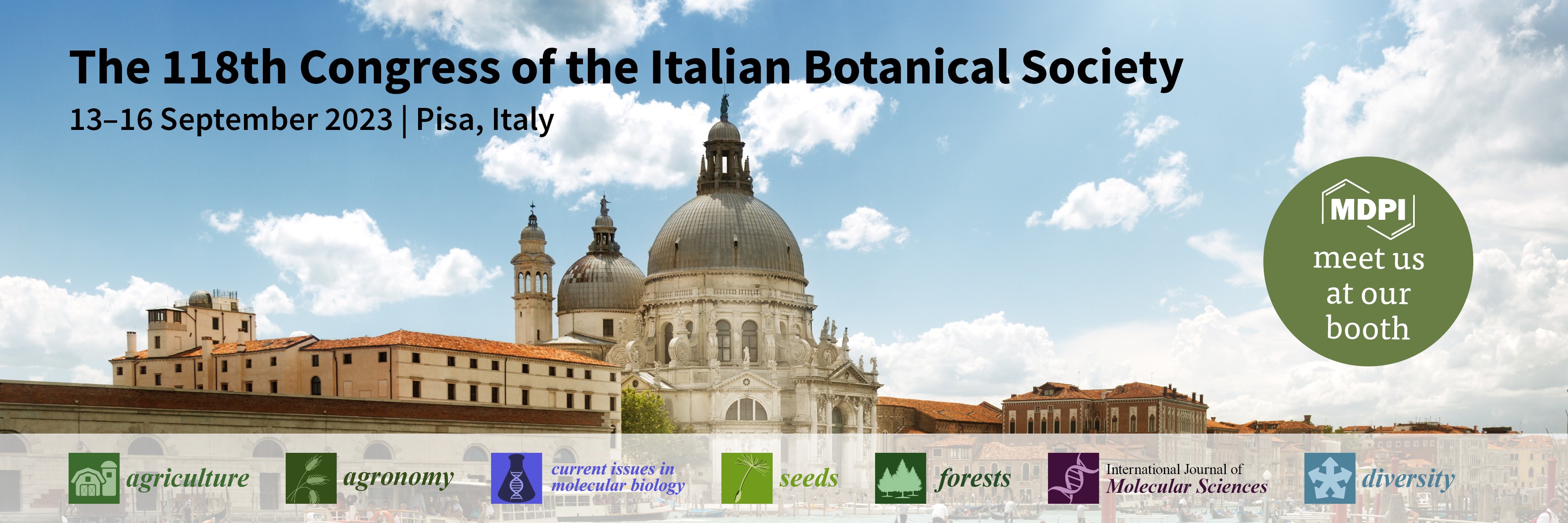
MDPI will attend the 118th Congress of the Italian Botanical Society. This event will be hosted by the Italian Botanical Society and will take place from 13 to 16 September 2023 in Pisa, Italy.
There will be speeches by internationally renowned experts in various fields of botany. The conference will introduce several innovations to ensure fair representation of all cultural areas of the association and to maximize the impact of the posters. Each full workshop exchange and each brief oral poster presentation will be associated with 1 of 42 keywords (6–8 from each macro theme), covering the diversity of research areas represented by the Social Work Group.
The following MDPI journals will be represented:
If you plan on attending this conference, please feel free to stop by our booth and speak with us. Our delegates look forward to meeting you in person and answering any questions that you may have.
For more information about the conference, please visit https://www.societabotanicaitaliana.it/118/eng/detail.asp?idn=5035.
27 July 2023
MDPI Insights: The CEO's Letter #2 - Open Peer-Review and IJERPH

Welcome to the MDPI Insights: The CEO's Letter.
In these monthly letters, I will showcase two key aspects of our work at MDPI: our commitment to empowering researchers and our determination to facilitating open scientific exchange.
Opening Thoughts

Open Peer Review Reports
Continuing the topic of openness from my inaugural monthly CEO letter, in these Opening Thoughts, I highlight the growth and importance of open peer-review reports at MDPI. Open peer reports align with the principles of open science, making the publishing process more transparent and facilitating rigorous peer review.
MDPI journals operate an open peer-review option by default, allowing authors to publish review reports and author responses (often referred to as open reports) together with the published paper. Publishing the reviewer reports and author responses together with the article provides greater transparency and trust for readers, as this allows them to track the editorial decision-making process. Open peer-review also encourages reviewers and editors to provide high-quality comments, as these will be made public if the article is accepted for publication.
Start and Growth of Open Peer Review at MDPI
The MDPI journal Life was a pioneer in offering this opportunity to its authors in 2014. The first MDPI article with peer-review reports openly published was a review by the Nobel Laureate Werner Arber, in which the review reports were published as supplementary material. By 2018, open peer-review was available across all MDPI journals. As such, MDPI authors have embraced the open peer-review model, providing a steady increase in the number of MDPI articles. As of 2023, approximately one-third (34.0%) of MDPI articles were published with open review reports.
As at July 2023, the percentage of MDPI articles published with open peer review has increased to 36.2% of the total papers published in 2023 so far, indicating ongoing growth in adoption.
Open peer review continues to play a critical role in the assessment of the peer-review process in Life. For further insights, please see the recent editorial by Dr. Pabulo Henrique Rampelotto, the former Editor-in-Chief of Life, who spearheaded the implementation of the open peer-review process.
Benefits of Open Peer Review
The benefits of open peer review include increased transparency, trust and constructive feedback. To promote open communication further and increase the robustness of the peer-review process, we encourage reviewers to sign their reports so that their name appears on the review report (this process is referred to as open identity). The default option is for reviewers to remain anonymous; however, by signing the reports, reviewers receive direct credit for their contribution to the peer-review process and show their commitment towards open science.
As the leading open access publisher, MDPI remains committed to promoting open peer-review and encourages authors to choose this approach. Our goal is to provide a rigorous and transparent peer-review process that benefits the scientific community, and we believe that open peer-review is a vital step in fostering openness and collaboration in scientific communication.
Impactful Research

MDPI Papers Cited in the News – IJERPH edition
Every month, our corporate marketing team compiles data from Altmetrics to create a list of MDPI papers that have been cited in the news. This list continues to grow as renowned news outlets regularly reference research published by MDPI in their articles.
During 2022, a total of 111,965 MDPI research papers were mentioned in prominent news outlets such as National Geographic, The Washington Post, Forbes, The Guardian, the BBC, CNN, Time, and Harvard Business Review.
Highly Cited Journal Publications
IJERPH, known for publishing impactful research, received the most news mentions among all MDPI journals in 2022, based on Altmetrics data:
- International Journal of Environmental Research and Public Health: 3509 mentions
- Nutrients: 2698 mentions
- International Journal of Molecular Sciences: 1701 mentions
- Journal of Clinical Medicine: 1131 mentions
- Viruses: 1111 mentions
These numbers show the recognition and impact of the articles published in IJERPH. For a more detailed view of the journal’s most cited and viewed papers, you can visit here. In total, IJERPH has garnered over 28,000 mentions in prominent news outlets, and as at July 2023, an impressive count of over 17,000 papers cited 10 times or more. These figures highlight the impactful contribution of IJERPH publications to the scientific community.
Example of Recent Mentions
During May and June 2023, a noteworthy selection of articles from IJERPH was cited in news articles, including:
The Washington Post: “Bringing nature inside can improve your health. Here’s how to do it.”
IJERPH paper: “Physiological Benefits of Viewing Nature: A Systematic Review of Indoor Experiments”
Harvard Business Review: “How to Take Better Breaks at Work, According to Research”
IJERPH paper: “Canine-Assisted Therapy Improves Well-Being in Nurses”
National Geographic: “Lyme disease is spreading fast—but a vaccine may be on the way”
IJERPH paper: “Range Expansion of Tick Disease Vectors in North America: Implications for Spread of Tick-Borne Disease”
Inside MDPI

MDPI Develops an Artificial Intelligence Tool to Enhance the Peer-Review Process
At MDPI, we believe that rigorous peer-review is the corner-stone of high-quality academic publishing. We are grateful to the scholars who generously dedicate their time to peer-review articles submitted to MDPI journals. Their contributions are invaluable to the advancement of science.
Peer-review is a critical part of the publication process, ensuring that MDPI upholds the highest quality standards for the papers we publish. Every manuscript submitted to our journals undergoes a comprehensive peer-review process conducted by subject-matter experts.
To further enhance our peer-review process, our Data Analytics team has developed an Artificial Intelligence (AI) tool designed to support the selection of reviewers. This proprietary tool utilizes Natural Language Processing (NLP), a specially designed AI language model, to extract information from the title and abstract of submitted papers. It then searches our database for similar manuscripts and suggests potential reviewers based on this analysis. Integrated with MDPI's submission system (SuSy), the AI tool cross-references the suggested candidates with our reviewer database to verify their invitation status and availability.
The goal of this tool is to provide better targeted peer-review invitations, reducing the number of emails sent for each paper and increasing the efficiency of our editorial staff.
In the near future, our Data Analytics team plans to deploy similar AI projects to improve other critical aspects of our services, offering an enhanced experience to our authors and readers.
Click here to learn about MDPI’s review process, including procedures, responsibilities, and benefits.
Read more:
Coming Together for Science
The Future of IJERPH

On 5 July 2023, Prof. Dr. Paul B. Tchounwou, the founding Editor-in-Chief of IJERPH, along with five Section Editors in Chief (Prof. Dr. Germán Vicente-Rodríguez, Prof. Dr. Karl Goodkin, Prof. Dr. William A. Toscano, Prof. Dr. Jimmy T. Efird, and Prof. Dr. William Douglas Evans), gathered in Basel to discuss the future of the journal. The meeting provided an opportunity to address the recent decision by The Web of Science to delist IJERPH due to the journal failing the Content Relevance criterion, and propose best strategies that will ensure high scientific rigor as well as a clear scope and aim of IJERPH, going forward.
While the delisting is disappointing for IJERPH, as well as for our authors, academic editors, and the entire scientific community supporting our journal, we see it as an opportunity to reflect and prepare for the future direction of the journal.
Since its launch in 2004, IJERPH’s vision and mission have evolved to be more complete and comprehensive in engaging scientific communities. In light of this, we will refresh the journal’s aims and scope, ensuring they align with the organic expansion of IJERPH. Additionally, we will restructure the journal sections into broader categories, encouraging collaborative research and transdisciplinary approaches for authors. This is designed to foster collaboration and knowledge exchange among diverse fields, contributing to a holistic understanding of health promotion and disease prevention. We are confident that these next steps will enhance the scientific strength and societal impact of our journal.

Journal Achievements
In addition to the productive discussions, we took the time to celebrate some of the remarkable achievements of IJERPH, which I highlight below:
- Founded by Prof. Dr. Paul B. Tchounwou in 2004
- Indexed in PubMed in 2008
- Received its first Impact Factor in 2012
- Published its 5000th paper in 2017
- Over 60,000 papers published as at June 30, 2023
- 131,628,173 paper views in 2018–2022
- Over 28,000 mentions in prominent news outlets
- 17,000 papers cited 10 times or more as at June 30, 2023
- No.1 journal in the 2022 Google Scholar Metrics in the category of Public Health
- Awarded several editions of Young Investigator Awards, Travel Awards, and Outstanding Reviewer Awards since 2018.
These achievements showcase the journal’s significant contributions to the field and its impact on global health. We are proud of the exceptional work accomplished by the IJERPH team and look forward to building upon this success in the years to come.
Closing Thoughts
MDPI’s Impact in Spain

During the past month, I had the opportunity to visit our new office building in Barcelona, where I met with our local colleagues to discuss the ways we serve the scholarly community, particularly in Spain. The multi-functional office plays a vital role in supporting various business needs, including editorial, design, conference management, data analytics, journal relationship management, publishing partnerships, and collaborations with societies.
Spain holds a significant position in MDPI’s global market, ranking as the fourth-largest contributor to the total number of papers published by MDPI as at July 2023, ranking next to Italy, the USA, and China, with Germany completing the top five.
The Numbers
Out of the 1,680,000 total MDPI articles published as at 25 July, almost 80,000 articles are contributed by Spanish authors, representing nearly 40,000 unique authors affiliated with Spanish institutions. Remarkably, over 6,300 of these authors hold editorial board member (EBM) positions within MDPI journals, with 30 of them serving as Editors-in-Chief (EiCs).
Our commitment to working with institutions is very evident in Spain, where we have successfully established over 40 Institutional Open Access Programs (IOAP) with esteemed institutions such as the University of Barcelona, the Autonomous University of Barcelona, Pompeu Fabra University, the University of Navarre, and Complutense University of Madrid.
Over the past five years, we have successfully organized eight in-person conferences in Barcelona, attracting over 1,150 registrations, with two forthcoming events scheduled for 2024. Barcelona's excellent connectivity to international airports makes it easily accessible to participants from around the world. Its welcoming atmosphere provides us with the perfect environment for knowledge-sharing, networking, and contributing to the local economy.
Our growth and presence in Spain are a true testament to the incredible service we provide to the scholarly community and the relationships we foster through responsive and collaborative communication. We look forward to continuing to support Spanish scholars, providing them a valuable and trusted experience with MDPI, the leader in open access publishing.
Testimonials
I close this letter as I did in the first edition, by sharing testimonials from our stakeholders. Here are a few IJERPH testimonials from a Spanish guest editor and an author:
Guest Editor
“I want to thank the kindness, attention and professionalism of the MDPI team throughout the editorial process of the Special Issue. I believe that it is a very professional and quality editorial process.”
- Professor Víctor Arufe-Giráldez, University of A Coruña
Special Issue in International Journal of Environmental Research and Public Health: Physical Activity in Childhood and Adolescence
Special Issue in International Journal of Environmental Research and Public Health: Physical Education: Present and Future
__
Author
“I want to thank the rigor of the revisions made to the manuscripts to improve their quality, the support to the authors for the editor assignment system they have and the follow-up they carry out, for the speed in answering and in carrying out the entire process of the revision, and for doing all this at an affordable price.”
- Dr. María Paz García-Caro, University of Granada
Article in International Journal of Environmental Research and Public Health: Factors Associated with Suicide Attempts and Suicides in the General Population of Andalusia (Spain)
Chief Executive Officer
MDPI AG



